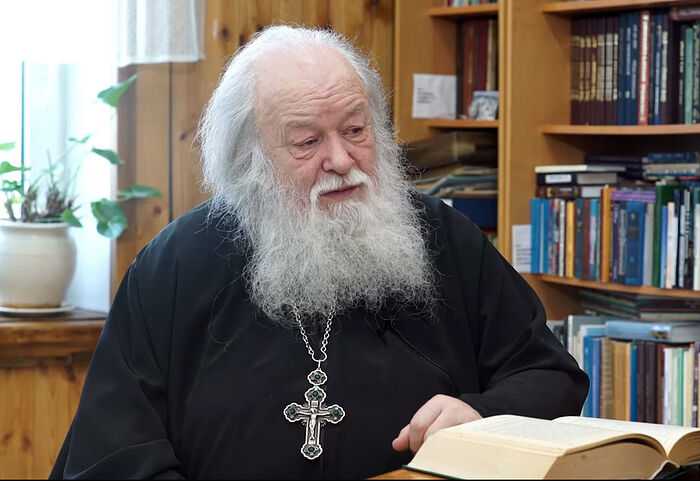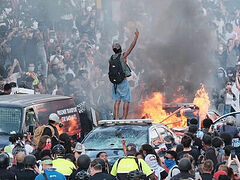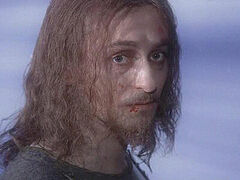The following is the second part of an important talk with Archpriest Valerian Krechetov, rector of the Church of the Protection of the Theotokos in the village of Akulovo of the Odintsovo district near Moscow.
—At the beginning of our talk you rightly noted that people who denounce and criticize those they don’t know are foolish. Many of us continually criticize and ridicule mainly our leaders, politicians, etc. This is how we find certain “lightning rods” at which we direct our “righteous anger.” These are visible figures, and they enable us to berate someone personally.
—I think we should pity them and pray for many of them because their cross is very heavy. For example, the hierarchs of our Church bear a very serious burden for us. If you can barely cope with such a burden even in your own family, it’s frightening to think about the scope of their responsibility!
Once a woman was shown various crosses. She wanted to take up the one that was most beautiful and heavy, but she couldn’t pick it up—it was the cross of royalty. She tried other crosses, but in the end she found a small wooden one—and it turned out to be hers!
Our Orthodox people have always been famous for their sense of humor and resourcefulness: “My own misfortunes seem awful, while another’s distress seems a mere trifle.”
St. John Chrysostom wrote: “Countries are made up of cities; cities are made up of homes, and home are made up of families. If there is discord between a husband and a wife, it spreads to the home, then to the city, and then there are disturbances in the world.” But as St. Nikolaj of Zica noted, the cause of everything is spiritual. And the spiritual state of society is the main reason behind what is happening in the world.
As for the fact that one should behave correctly with the “otherworldly powers”, I always recall the life of Blessed Andrew the Fool-for-Christ. In the Slavonic version it beautifully describes how St. Andrew hears a guardian angel and a demon fight for the soul of a monk. “The monk is mine,” says the demon and arguments this by the monk’s deeds. “No, he’s mine,” says the guardian angel, listing the monk’s good deeds. Then they quote the Scriptures backwards and forward! And the Life reads: “The saint marveled at how cleverly demons quoted the Holy Scriptures.” By the way, the enemy won that battle for the monk’s soul, and the guardian angel was forced to retreat with sadness. Blessed Andrew felt sorry for the monk and said to him: “Behold what a struggle there is for the souls of men! So, think about who you’re serving when you do bad things!” Seeing this, the demon said to the saint: “I knew that your intentions were no good while you were listening to us! There is no one as harmful as you in the whole of Constantinople!” Blessed Andrew replied so sincerely and kindly: “Listen, no offense, but what do you get out of this?” “Nothing!” said the demon, “and they even beat us over there!” That is, the saint had a sincere dialogue with the demon!1 How prudent the ascetics were!
And I will give you another example from the Patericon. A monk found himself at the gates of hell and suddenly heard someone shouting, “Well, get to work, evil ones! Catch more souls! Choose your own weapons!” Then the same voice shouted: “Stop! I’ll hand them out myself! What do you want me to give you ?!” “Anger!” came one reply. “We’ve run out of anger!” So he mused on, “Well then, lust, drunkenness, lechery—these are all ordinary things, too obvious, and not everyone may react to them.” But anyone can irritate and provoke anger in others! That is why we pray, “That we may be delivered from all tribulation, wrath, and necessity” (from the Great Litany of the Divine Liturgy of St. John Chrysostom).
But only now has it come home to me that hell also has a deficit! There was not enough anger for everyone!
At one time there we used to joke: “What kind of hell do you want—a socialist one or capitalist one? In the capitalist one all torments will be on time, and in the socialist one something won’t be brought and something will be stolen.” Jokes aside, I see such cases now: Five people were together; four got sick and one didn’t. Why? Not enough infection! The fact is that man has never created anything that reproduces. Even when mankind begins to interfere with what was created by God, it stops multiplying! This applies to infections, too... Therefore, you should never be afraid of evil. If I’m not mistaken, the holy recluse George of Zadonsk said, “Whoever is afraid of demons does not fear God, he fears the enemy, and this fear is born of unbelief.” Indeed we often fear the enemy, because of our lack of faith in God.
—Fr. Valerian, we talked earlier about the Revolution. People really were trying to intervene in spiritual processes using “human” means, and we see what then happened in Russia. On the other hand, some argue that this was the way it had to be, and it was arranged by God so we could renew our lives and repent. But can we really blame God for wanting these terrible sacrifices? In the Gospel of Matthew we read: I will have mercy, and not sacrifice (Mt. 9:13).
—These are two different things! We say: “For Thou art a merciful God and lovest mankind” (from the Liturgy of St. John Chrysostom). But the concepts of “sacrifice” and “mercy” are spiritual. Mercy doesn’t mean giving you “all that is good.” But we were building a new society (in the USSR) for that very purpose: to supposedly give everyone everything they wanted so there might be plenty to go around. What is sacrifice? A sacrifice unto God is a broken spirit; a heart that is broken and humble, God, will not despise (Ps. 50:19). I will have mercy, and not sacrifice. It is this sacrifice—mercy for our neighbor—that God wants from us. Take the poor widow who put two mites into the Temple treasury. Many made generous donations, but the widow put only two mites. And the Lord said that she had given the most! Because it was real sacrifice from her!
It is no coincidence that when I was recently in Cyprus, I heard the following conversation: “Earlier Cyprus was tried by foreign invasions, but today it is tried by prosperity.” What is “prosperity”? Incidentally, before the Revolution Russia was moving toward prosperity by leaps and bounds. According to estimates by many economists, it would have soon become one of the leading economies (if not the leading economy) in the world. But where did those people come from who destroyed churches during the Revolution? By that time, many people had stopped observing fasts, attending church services, or in general living the spiritual life.
When about fifty years ago Fr. Sergei Orlov and I were talking on the same subject, he remarked, “All of this is interesting, but God was forgotten!”
So that’s the whole point! What happens in the spiritual realm—in the invisible world—is sometimes very different from what we see here on earth.
I read the following story somewhere: A church was packed with people, the service was beginning. The deacon went to the solea, raised his orarion, and pronounced the first exclamation—but there was complete silence. The choir conductor was waving his hands—but there was still silence. And in that silence, suddenly a child’s faint voice was heard: “Lord, have mercy on my mommy!” What is this allegorical story about? The service is going on, but no one in the church is praying!
I recently read the memoirs of a spiritual father. He said to one “fool-for-Christ”: “I celebrated today, and the church was packed.” “You didn’t celebrate today!” said the fool-for-Christ.” “What do you mean? I even delivered an excellent sermon!” “No,” said the saint, “you argued with your wife and the Lord didn’t allow you to celebrate the service. An angel celebrated instead of you. And there were only six communicants at the church!”
Some recall a certain prophecy: “There will be splendor all around, but it won’t be possible to go to churches.” However, this isn’t the case. We don’t know who spoke these words or when, and this is not an exact quote. The prophecy that “people won’t go to church” is literally being fulfilled, especially today: People are held back for obvious reasons, but those who want to, go and pray. And thus, true Christians gather.
Formerly on Pascha there were crowds of people in the churches. But what for? To watch annual cross procession. On the other hand, St. John Chrysostom proclaimed, “Let all draw near.” Yes, you’ll draw near—but how? St. Theophan the Recluse wrote: “Receive Holy Communion as often as possible.”. But how do you do it? With a feeling of complete unworthiness, like someone who has nothing else to rely on. You need to have a broken and contrite heart. But who draws near in our days?
Even in the time of St. Macarius the Great, spiritual elders had visions during Communion: Some drew near and partook of the Holy Mysteries, while others consumed burning coals. This is the Holy Fathers’ testimony; this is the true life of the Church.
The Prayer of Absolution is read over all of us (including the clergy) when we confess. We all sin in some way. And there are these words: “Reconcile and unite him to Thy Holy Church.” Are we always in the Church? It’s hard to say for certain! This is not yet our final state, but a temporary state—when we depart the Church for a time.
Hieromartyr Sergei Mechev spoke about this. He drew attention to this, and called the parish a “liturgical and penitential family.” Repentance is the heart of spiritual life. St. Ignatius (Brianchaninov) said, “A sinner who sees himself as a sinner is better than a righteous man who sees himself as righteous.” Of course, this doesn’t imply that it is better to be a sinner than righteous! If you are a sinner, then acknowledge yourself as a sinner. But if you are righteous in some way, still acknowledge yourself as a sinner. And by your inner state you will be justified before God, because by the deeds of the law there shall no flesh be justified (Rom. 3:20). What heights the Apostle Paul attained! But towards the end of his life he testified: For I am the least of the apostles, that am not meet to be called an apostle, because I persecuted the Church of God. But by the grace of God I am what I am (1 Cor. 15:9–10). And how carefully he urged us to judge our state: But though we, or an angel from heaven, preach any other Gospel unto you than that which we have preached unto you, let him be accursed (Gal. 1:8). A person can stumble and make mistakes, but if he has an awareness of his own unworthiness and weakness, it won’t harm him. This is sacrifice to God. A sacrifice unto God is a broken spirit; a heart that is broken and humble, God, will not despise (Ps. 50:19).
Regarding mercy, it’s not all so simple. The apostles said, “Let your alms sweat in your hands, until you know who to give them to” (from the Didache). We often give alms without thinking. You do well, but is it good for the one you gave them to? If he receives alms all the time, he may become a parasite. Will this be a mercy for him or not?
It is often said that humility is the chief virtue, but I will say that the gift of discernment is higher than the gift of humility! And discerninment is from God; if the Lord gives it to you, you will be able to judge correctly. But if He doesn’t, you won’t understand anything! The Lord opened… their understanding, that they might understand the Scriptures (Lk. 24:45).




